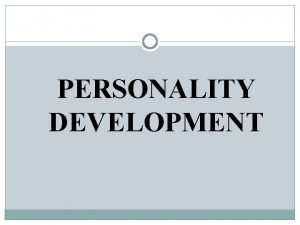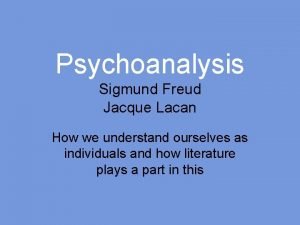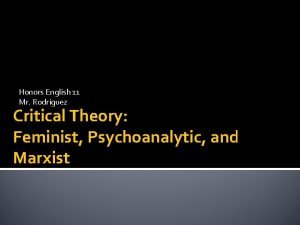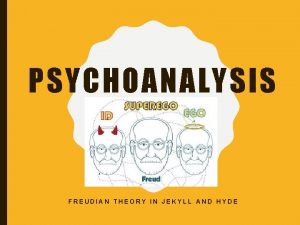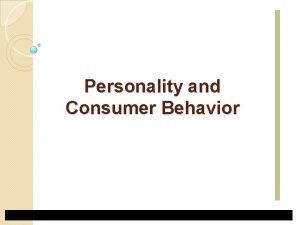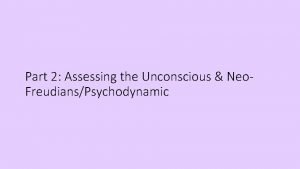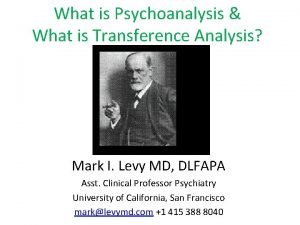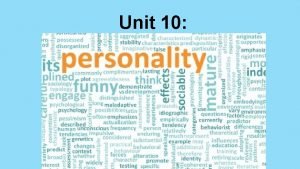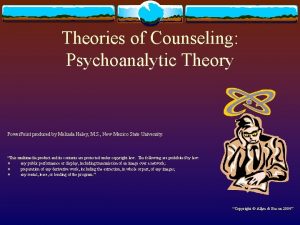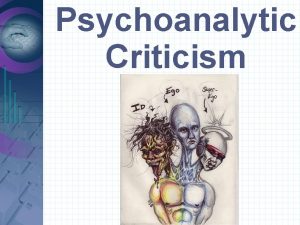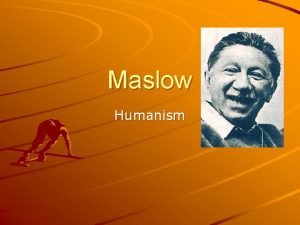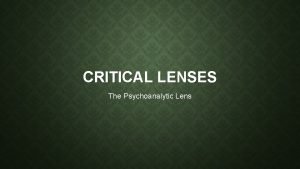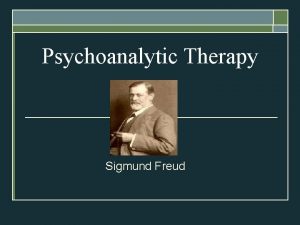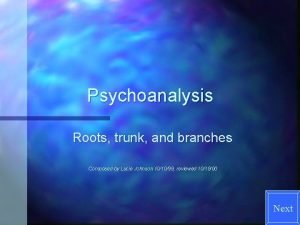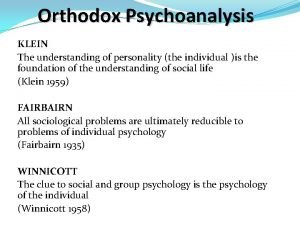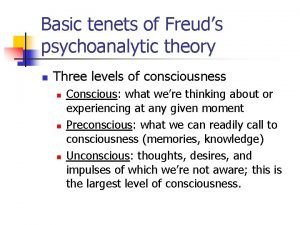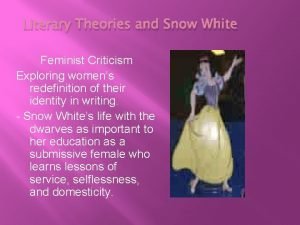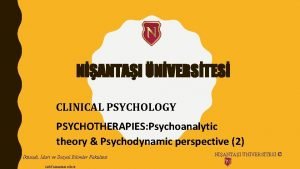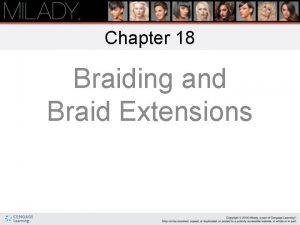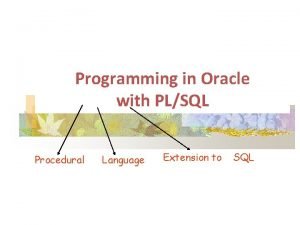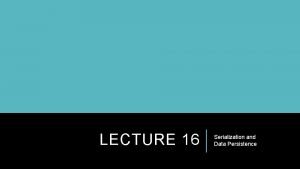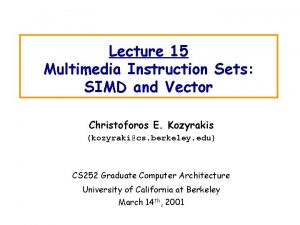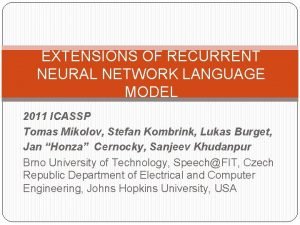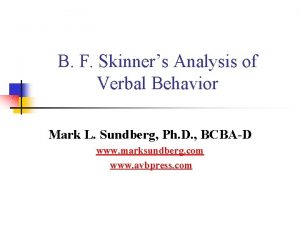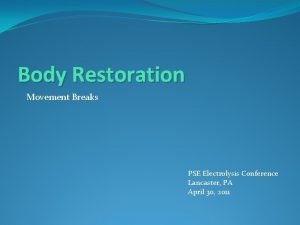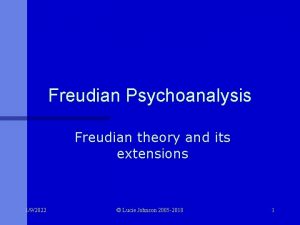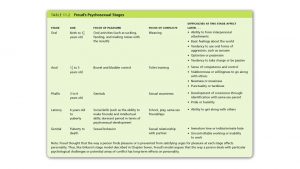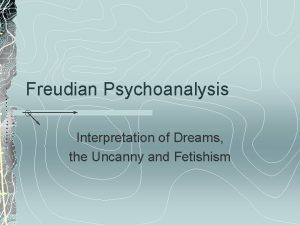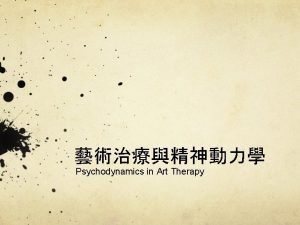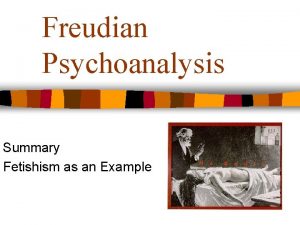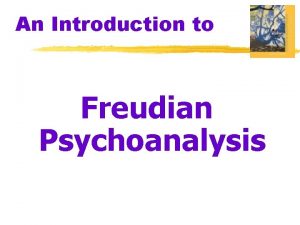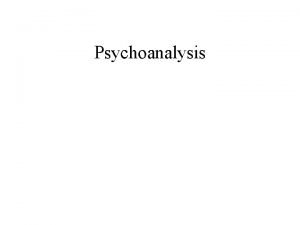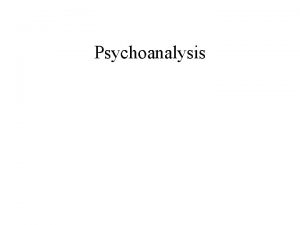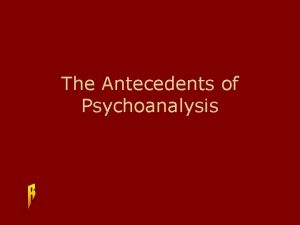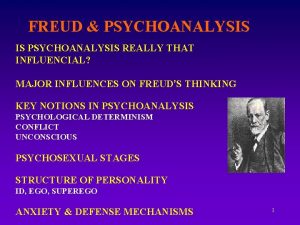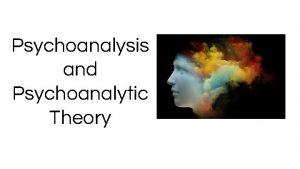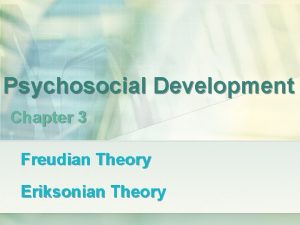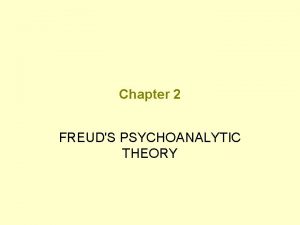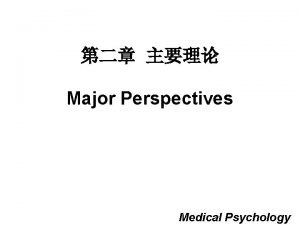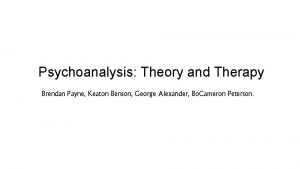Freudian Psychoanalysis Freudian theory and its extensions 9302020







































- Slides: 39

Freudian Psychoanalysis Freudian theory and its extensions 9/30/2020 © Lucie Johnson 2004 1

Freud and Desire There is, said Freud, an unbridgeable distance between desire and reality. We have in us insatiable desires for love, fulfillment, meaning, power etc. n That distance causes suffering. Hence suffering is an inescapable part of the human condition. n 9/30/2020 © Lucie Johnson 2004 2

How to Manage Desire How to manage desire (seen as coming out of drives) is the central question of Freudian therapy. n What does one do with desires that cannot be actualized? With the experience of our own powerlessness? n 9/30/2020 © Lucie Johnson 2004 3

Are the “Desires of our Heart” Unconscious? n n Freud thinks so. He places them deep within ourselves, at a primitive infantlike level. They are absolute desires for things such as total happiness, complete gratification. The Psalmist says: ” Delight yourself in the LORD and he will give you the desires of your heart” (PS 37: 4) What do you make of this? 9/30/2020 © Lucie Johnson 2004 4

The Unconscious For Freud, this is the place for the pain of repressed trauma, impossible hopes and unacceptable longings, great anger and destructiveness, creativity, life energy, and terror. n All behaviors and problems have their root there. n 9/30/2020 © Lucie Johnson 2004 5

What does Freudian Therapy Aim to Do? Therapy aims to help the client obtain some access to the unconscious material that creates troublesome behavior. n For example: why does X repeatedly fall in love with someone who is unavailable? n 9/30/2020 © Lucie Johnson 2004 6

But if the Unconscious is unconscious, how can someone possibly know what is going on there? 9/30/2020 © Lucie Johnson 2004 7

Hypnosis and the Unconscious n n n Of special interest is the phenomenon of post hypnotic suggestion. Under hypnosis, Terry is given the instruction to get up and stretch later, when the trance is over, and the hypnotist says “winter”. Later, the hypnotist says: “we sure are having a cold winter”. Terry gets up and stretches. 9/30/2020 © Lucie Johnson 2004 8

Post Hypnotic Suggestion and the Unconscious n n n Terry then, getting up and stretching, says : ”I just felt so stiff”, (or gives some other justification for the stretching). In fact, Terry's motivation is unconscious. Terry also cannot remember what went on during hypnosis. That too has become unconscious. 9/30/2020 © Lucie Johnson 2004 9

Hypnosis and the Unconscious Post hypnotic suggestion shows that unconscious motivation can exist. n Hypnosis itself will sometimes allow someone to remember a forgotten trauma (though such “memories” may not be reliable) n 9/30/2020 © Lucie Johnson 2004 10

Hypnotists (MD’s) who Influenced Freud n n Charcot (1825 -1893), in Paris, viewed hysteria as a minor form of epilepsy. Only hysterics were hypnotizable. brought about catharsis by duplicating , under hypnosis the original trauma that caused hypnosis Bernheim (1840 -1890), in Nancy, viewed hypnosis as normal. He emphasized posthypnotic suggestion. 9/30/2020 © Lucie Johnson 2004 11

Freudian Concepts and Hypnosis With Charcot, Freud adopted the notion of traumatic event and the notion of catharsis. n With Bernheim, Freud adopted the notion of unconscious motivation. n The phenomenon of hypnotic amnesia, confirmed Freud’s notion of the unconscious. n 9/30/2020 © Lucie Johnson 2004 12

How Did Psychoanalysis Access the Unconscious? From hypnosis n To free association n To the study of dreams n To the observation of everyday life n To play therapy n 9/30/2020 © Lucie Johnson 2004 13

Studies in Hysteria: the Emergence of Method With Breuer(1842 -1925), Freud studied Anna O. , aka Bertha Pappenheim n Phenomena observed: spontaneous trances, pathogenic ideas, catharsis, transference, hysterical pregnancy, a variety of repressed traumatic events. n 9/30/2020 © Lucie Johnson 2004 14

From Hypnosis to Free Association n Freud was not a good hypnotist, hence got patients to relax instead. He placed his head on their forehead and asked them to say the first thing that came to their mind (free association). He theorized that, since the patient would remember what happened, the cure would be more stable than a hypnotic cure. 9/30/2020 © Lucie Johnson 2004 15

The Interpretation of Dreams (1900). n n n Every human being dreams. So everyone has an unconscious layer from where these dreams come. Dreams, in their LATENT (symbolic) CONTENT reflect the workings of the unconscious. The dream’s manifest content (stories and images) are a condensed expression of unfulfilled unconscious wishes. 9/30/2020 © Lucie Johnson 2004 16

Organization of the Personality n n n In everyone there exists a primitive, instinctual layer of thought: the ID, which seeks to satisfy itself (pleasure principle). The ID (tr: IT) then encounters a limiting REALITY, and the EGO (tr: I) develops (reality principle). The EGO encounters a limiting SOCIAL REALITY, and the SUPEREGO (tr: that which is over --supervises-- the “I”) develops. 9/30/2020 © Lucie Johnson 2004 17

Personality is a Process The ID, EGO and SUPEREGO are not “things”, they are modes of operation of the self, layers of thoughts and feelings. n There is always an ebb and flow between the three processes, and a need to harmonize them. n 9/30/2020 © Lucie Johnson 2004 18

Health is a Balancing Act The ID pushes our inner desires n The SUPEREGO considers what is allowed or forbidden (superego), and also who we would ideally like to be (ego ideal). n The EGO balances this within the realm of possibility. n 9/30/2020 © Lucie Johnson 2004 19

Handling Dangerous Materials n n When the ID pushes forth an unacceptable impulse, or when something awful happens that a person cannot handle, the EGO may push it back into the unconscious and REPRESS it. Repression is the basis of all defense mechanisms, and it itself is an unconscious process that happens automatically. 9/30/2020 © Lucie Johnson 2004 20

Repression and Psychological Blindspots n Freud would say that the reason we do not really know ourselves is due to the fact that we repress (unconsciously) much of what we do not like about ourselves, or found threatening at some point in our lives. 9/30/2020 © Lucie Johnson 2004 21

When Repressed Material Resurfaces n Repressed material or drives often tries to resurface. It may appear in dreams, behaviors (ex: missing an appointment, losing an object), or the EGO may disguise them through defense mechanisms. 9/30/2020 © Lucie Johnson 2004 22

Defense Mechanisms Defense mechanisms are a way the EGO transforms unacceptable material from the ID, so it will get by the SUPEREGO. n The creation of defense mechanisms is an unconscious process. n 9/30/2020 © Lucie Johnson 2004 23

Defense Mechanisms Build Civilization n n Sublimation thought Freud is responsible for scientific and artistic endeavours, for the building of cathedrals and skyscrapers, and all the accomplishments of civilization. Other defense mechanisms can be more or less useful, depending on their frequency and the form they take. 9/30/2020 © Lucie Johnson 2004 24

Some Other Defense Mechanisms n n n n Denial Reaction formation Projection Rationalization Displacement Regression Link to a more complete list and examples 9/30/2020 © Lucie Johnson 2004 25

Freud and theory of recapitulation The id, for Freud, reflected a more primitive way of thinking. Primitive societies function more according to the id. n The superego builds civilization. n The child reflects this species development in his/her own development. n 9/30/2020 © Lucie Johnson 2004 26

Personality and Development n n Sometimes a given stage was particularly rewarding, and thus marked personality development (ex: dependent oral personality, orderly anal personality) The phallic stage is the most difficult because it is about the sorting out of gender roles and family relationships. 9/30/2020 © Lucie Johnson 2004 27

The Phallic Stage When recounting childhood memories, many of Freud’s patients recalled sexual interactions with an adult. n First at first believed this, but later came to the opinion that these “memories” were in fact imaginary. n 9/30/2020 © Lucie Johnson 2004 28

Stages of Development Oral (incorporative and aggressive) n Anal (aggressive and retentive) n Phallic (Oedipus [boys] and Electra [girls] conflicts) n Latency n Genital n 9/30/2020 © Lucie Johnson 2004 29

Childhood Seduction Were Freud’s patients in fact abused? Were their memories real? n Current controversy: n ØAbout Jeffrey Masson’s work ØJeffrey Masson himself 9/30/2020 © Lucie Johnson 2004 30

Death and life n n In the later part of his career, Freud also emphasized the notion of LIFE instinct or EROS (in which he subsumed the LIBIDO -lit: I want- issuing from the ID) He also developed the concept of DEATH instinct or THANATOS, a deep destructive tendency. In final analysis, he said, life is a detour toward death. 9/30/2020 © Lucie Johnson 2004 31

Freud and Anna, his Daughter (1895 -1982) n n Anna brought Freudian concepts to her work with children. Used play materials, drawings, home observation Stressed the concept of therapeutic alliance Expanded the role of the Ego and Ego defense mechanisms 9/30/2020 © Lucie Johnson 2004 32

Melanie Klein (1882 -1960) n n Better known in Europe than in the US, one of the pioneers in child therapy, especially projective play therapy and drawings. Emphasizes the role of fantasy even in infancy: the baby interprets what is happening, viewing things from his/her limited perspective. 9/30/2020 © Lucie Johnson 2004 33

Inner-Objects n n n The baby perceives any pain or frustration as coming from a hostile world, and is angry and hostile in return at the “bad mother” Also, the baby develop “good” inner objects when gratified, and is happy. Eventually, the child puts things together into an understanding of the mother as one person. 9/30/2020 © Lucie Johnson 2004 34

Object Relations Theory The infant forms a number of inner -objects. From his/her relations with these objects, personality characteristics progressively develop. n Melanie Klein is a founder of the currently quite popular Object Relations Theory. n 9/30/2020 © Lucie Johnson 2004 35

Margaret Mahler (1897 -1985) n Margaret Mahler --who worked with severely autistic children-became interested in the process of INDIVIDUATION, that is to say of the child’s development of a separate self --distinct from the mother. 9/30/2020 © Lucie Johnson 2004 36

Individuation (Mahler) n n n The child starts completely absorbed in the mother (normal autism) Then comes a stage of symbiosis The child then starts to separate After a while, there is “rapprochement”, a coming back together And finally a developed self (around 3) 9/30/2020 © Lucie Johnson 2004 37

Mahler and Freud Mahler’s stages can be harmonized with Freud’s oral and anal stages. n Mahler considered herself to be in the psychoanalytic tradition. n 9/30/2020 © Lucie Johnson 2004 38

The End 9/30/2020 © Lucie Johnson 2004 Start 39 again
 Anal stage psychology definition
Anal stage psychology definition Teoría de lacan
Teoría de lacan Psychoanalytic
Psychoanalytic Therapies defined as “talk therapies” include
Therapies defined as “talk therapies” include Jekyll and hyde psychoanalysis
Jekyll and hyde psychoanalysis The freudian concept of the ego is best described as *
The freudian concept of the ego is best described as * Psychodynamic and humanistic therapies have in common
Psychodynamic and humanistic therapies have in common Personality definition in consumer behaviour
Personality definition in consumer behaviour Neo freudian theory
Neo freudian theory Introducing and naming new products and brand extensions
Introducing and naming new products and brand extensions Introducing and naming new products and brand extensions
Introducing and naming new products and brand extensions Transference psychology
Transference psychology Psychoanalysis
Psychoanalysis Sigmund freud psychodynamic theory
Sigmund freud psychodynamic theory Psychoanalysis focuses on
Psychoanalysis focuses on Shrek psychoanalysis
Shrek psychoanalysis Free association
Free association Humanist maslow
Humanist maslow Psychoanalysis lens
Psychoanalysis lens Psychoanalysis techniques
Psychoanalysis techniques Branches of psychoanalysis
Branches of psychoanalysis Orthodox psychoanalysis
Orthodox psychoanalysis Main tenets of freud psychoanalytic theory
Main tenets of freud psychoanalytic theory Snow white feminist
Snow white feminist Projection in psychology
Projection in psychology Transference meaning psychology
Transference meaning psychology What is the most effective way to prepare hair for braiding
What is the most effective way to prepare hair for braiding Extensions of demand and supply analysis
Extensions of demand and supply analysis University of kent extensions
University of kent extensions Extension in hybris
Extension in hybris Oracle procedural language extensions to sql
Oracle procedural language extensions to sql What is the use of serialization
What is the use of serialization Simd extensions
Simd extensions Extensions of recurrent neural network language model
Extensions of recurrent neural network language model Point to point correspondence and formal similarity
Point to point correspondence and formal similarity Streaming simd extensions
Streaming simd extensions Data mining extensions
Data mining extensions Finger extensions
Finger extensions Reactive extensions net core
Reactive extensions net core Mapping extensions
Mapping extensions
